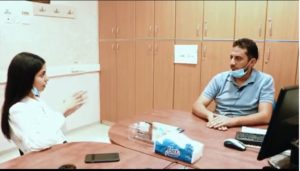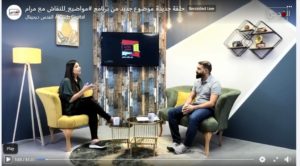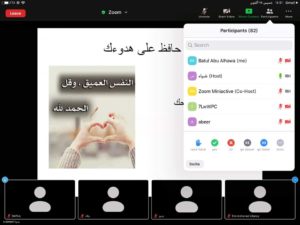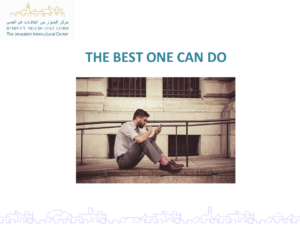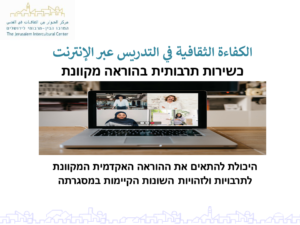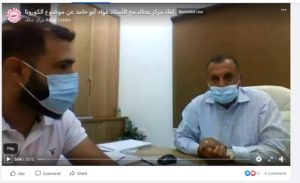Ha’aretz Article Highlights the Behind-the-Scenes Work in East Jerusalem
On October 25, Ha’aretz journalist published an article about the IDF’s Home Front Command’s system-wide efforts in East Jerusalem to fight COVID-19. It describes the different avenues and connections that have been made, that have enabled a relative containment of COVID-19 in East Jerusalem in the second wave, after the infection rate spiked in the summer months.
We’re not mentioned in the article, but much of what has been possible has been the result of the tireless work of the JICC. As soon as COVID-19 hit Israel, the JICC established and continues to coordinate a 160-member WhatsApp group of civil society leaders in East Jerusalem. This is much more than a channel of communication; it has enabled numerous initiatives to take place that help to help East Jerusalem Palestinians fight the spread of COVID-19. As a result of our deep and extensive network of Palestinian civil society actors, the JICC was asked to join the Municipality’s Control Center, the first NGO to ever be asked to join the emergency control center. JICC Director spoke a bit about this at a Jerusalem Foundation Switzerland online event entitled, “Diversity and Inclusion in Times of Crisis.” You can read more about that here. In May of this year we were quoted in the Jerusalem Post as well. You can read about that here.
These efforts are complementary and in addition to the specific efforts of the Atta’a Assistance Center for the Rights of East Jerusalem Residents and the MiniActive Network of Palestinian women. You can read about their activities here and here, respectively.
Here are relevant parts of that article:
Today, in his role as head of the coronavirus control center for Jerusalem, [Brig. Gen. (res.). Ben-Zvi Eliassi] has had to build a completely new kind of relationship with the city’s residents.
Evacuating and isolating confirmed COVID-19 patients is an important part of the center’s activities. As a result, the Home Front Command runs hotels in East Jerusalem that are designated for that purpose. An assistance network has also been set up for the families of patients and for those required to go into quarantine to encourage them to follow the guidelines and to provide them with food and medicine.
“Patients feel that there is someone looking after them, so they don’t leave home,” Eliassi said. “In addition, there is enforcement at the individual level to make sure people follow the rules. Patients know they’re being monitored, and they don’t break the isolation rules.”
Some of the personnel at the coronavirus control network are paid by the Defense Ministry and the municipality, while others are volunteers who look after the needs of patients and those in quarantine. The control center works through Jerusalem’s community administrations (local neighborhood councils with fairly broad powers, which operate in both the eastern and the western parts of the city). It pays the salaries of the person in the neighborhood who is responsible for coronavirus operations, along with the coordinator of volunteers and the coronavirus “trustee,” who monitors compliance with rules and is involved in contact tracing.
…
The Home Front Command center has relied on a network of paid personnel and volunteers, as well as young women from East Jerusalem doing alternative national service. The cooperative effort required the center to surmount political and social obstacles. While army uniforms are considered less problematic in East Jerusalem neighborhoods than those of the Border Police, Palestinian encounters with uniformed Israeli personnel can still be tense.
East Jerusalem activists have agreed with the Home Front Command that the coronavirus is a common enemy, which has helped reduce tensions. But other residents of East Jerusalem have said that the activists who have been working with the soldiers are not from the mainstream of Jerusalem Palestinian society.
Instead, they say, they are Palestinians who have tended in any event to be more cooperative with Israel. Contrary to expectations, however, since the beginning of the second wave, there has been almost no opposition to such cooperation in the field or on social media.
An expert on East Jerusalem who has been following the control center’s activities said there are three types of Palestinian activists and organizations in Jerusalem. “There are activists who always cooperate with the municipality, and they were the first to jump on the bandwagon,” he said.
“The question is how accepted they are and how representative of the population. Alongside them are the community administrations that have received generous funding and have proven that they have a high capacity to carry things out. And then there are the folks who can’t even utter the word “city hall” – but even there, the beginnings of cooperation can be seen. It’s done through quiet dialogue – things that we haven’t seen in the past. The subsiding of the Palestinian issue is also manifesting itself in Jerusalem.”
You can read the original article here.
As noted above, much of the activity in East Jerusalem is thanks to the behind-the-scenes work of the JICC. We are honored to help fight the spread of COVID-19 in East Jerusalem.


